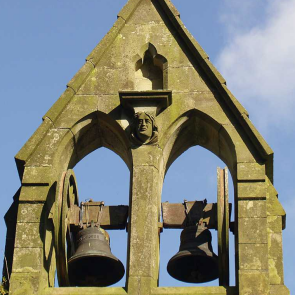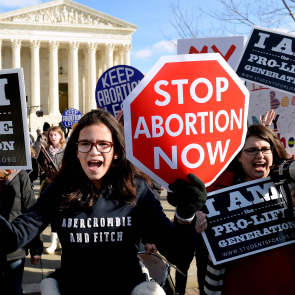A Supreme Court decision to rule on an appeal against a Texas house bill restricting abortion in the state, will thrust the issue to the heart of next year’s US presidential election and could define the path of abortion in the US for the foreseeable future.
House Bill 2 which banned any abortion in the state after 20 weeks, requires abortion clinics to meet the same standards as hospital-style surgical centres and says that doctors have admitting privileges to hospitals within 30 miles of the facility where he or she performs abortions.
Texas says that many clinics were “unclean” and that their laws are there to make abortion safe. Since the law was passed two years ago about half of the 41 abortion clinics in the state have been forced to close for failing to meet the new standards.
And if the challenge to the law fails a further 50 per cent will close. It will mean that, in one of the most populous (and largest geographically) states in the union, people seeking abortion will have to travel hundreds of miles to terminate a pregnancy.
It will also mean the same in a number of other states, as this is a test case and many more state legislatures are looking to restrict the practice of abortion.
It will also bring the subject to the front of the US presidential debate as the Supreme Court decision will be published right in the middle of next year’s campaign, in July 2016.
Pro-life, a staple campaign for US Catholics, is back on the agenda.
Critics call the Texas law “deceptive”.
The Center for Reproductive Rights, the campaign group behind the challenge, is at one extreme of the debate. It advocates “reproductive freedom as a fundamental human right” and believes abortion providers are “human right defenders”.
MORE NEWS, MORE ANALYSIS IN THE TABLET...
Read full analysis and comment on all the latest stories in this week’s print edition of The Tablet. To subscribe click here
At the other end Texas - and many other Republican majority states, encouraged by the pro-life movement - are pushing at the very basis of abortion law in the United States - Roe vs Wade. They want to see it gone.
Roe vs Wade in 1973 rubber-stamped a woman’s fundamental right to an abortion under the 14th Amendment of the US Constitution which prohibits individual states from depriving persons of liberty.
The US has softened this stance since: in 1992 the case of Planned Parenthood v Casey upheld that right but said that because abortion "involves the purposeful termination of a potential life" it must be seen as sui generis, or in a class of itself.
The Supreme Court ruled it was fine that prior to a pregnancy being viable (when a foetus can be born and have a reasonable chance of survival) local government had no right to interfere, but after viability the State has a legitimate interest in protecting any “potential life”.
Liberty of the pregnant woman vs the human right of her unborn child is the unbalanced equation.
The Roe vs Wade ruling swerved this issue but now a consistent stream of abortion rulings across the US is bringing that fundamental debate to the surface.
And it’s already beginning to happen.
In 2008, Colorado attempting to change the definition of a person to "any human being from the moment of fertilisation" but failed; as did Mississippi in 2011; North Dakota voted the same through its House of Representatives but failed at Senate level; South Dakota went one further, only being vetoed by the governor on a technicality.
It takes just one of these to pass in the future and the Supreme Court will have to directly challenge Roe vs Wade, the roadblock to any real change in the federal stance on abortion.
An official report of the US Senate Judiciary Committee in 1983 remains substantially true today: "...That no significant legal barriers of any kind whatsoever exist today in the United States for a mother to obtain an abortion for any reason during any stage of her pregnancy."
Despite those failures at state level, pro-abortion campaigners have still been trying to plug a leaking ship over the last few years as anti-abortion laws have been on the rise at local level.
 Pro-life and pro-choice campaigners clash outside the Supreme Court building in Washington (PA)
Pro-life and pro-choice campaigners clash outside the Supreme Court building in Washington (PA)
As of this month, 19 states have banned abortion after viability; 28 states have a waiting period for an abortion in place; 17 states require a woman seeking a termination to have counselling; 32 states prohibit the use of state funds, and 11 of those states won’t allow private insurance to fund abortions, according to the Guttmacher Institute.
Legislation has been a key weapon for pro-life campaigners in halting the rise of abortions, but public attitudes are also shifting.
Several of the states that have been most aggressive in passing anti-abortion laws — including Indiana, Missouri, Ohio, and Oklahoma — have seen their abortion numbers drop by more than 15 per cent since 2010.
Even more liberal states, like New York, Washington and Oregon, had similar declines even with unrestricted access to abortion.
A survey, carried out by Associated Press earlier this year, showed a decrease in abortions of about 12 per cent across the US since 2010.
In a number of states, public opinion is with the legislators on banning abortion outright. This month, a poll in Tennessee found that 53 per cent of people interviewed were adamant that all abortion should be illegal.
MORE ON ABORTION DEBATE...
154,000 people sign petition against Amnesty's abortion campaign
Pro-lifers celebrate as abortions stopped for lack of doctors
American pro-life clinic opens in Northern Ireland
Joe Biden candid on abortion and his US presidential ambitions
Elsewhere, people are unsure - and regular polls show this: the latest Gallup poll said 50 per cent of people consider themselves pro-life, but 61 per cent believe that it should be illegal to have an abortion for purely economic reasons.
And 61 per cent believe that abortion should be illegal after 13 weeks.
Any decision by the Supreme Court may fast-track a much needed debate on the subject ahead of a presidential election.
The Democrats and Republicans are seemingly miles apart, but there is some wiggle room. While Republicans are completely pro-choice: mostly looking to have abortion banned except for exceptional circumstances, the Democrats have been less clear.
Hillary Clinton is pro-choice but wants fewer abortions and is a sucker for good polling data. Rival for the Democrat nomination Martin O’Malley vaguely wants abortions to be “safe, legal and rare”.
Only renegade Democrat Bernie Saunders is a dyed in the wool advocate of complete abortion rights regardless of the viability questions.
Any debate on the issue will be a welcome one for Americans, and one they want to hear about: more than one in five voters say they will only vote for a candidate who holds the same view on abortion as them.
And more Americans are labelling themselves as pro-lifers. What was just 37 per cent in 1996 is now 46 per cent, and just a percentage point off those labelling themselves pro-choicers.
The time for that debate, it would seem, is upon us.
KEEP UP TO DATE ON TWITTER AND FACEBOOK...
Follow all the latest news and events from the Catholic world via The Tablet's Twitter feed @the_tablet
Or you can join in the debate at our community page on Facebook




 Loading ...
Loading ...
What do you think?
You can post as a subscriber user ...
User comments (1)
The terms pro-life and pro-choice are misleading.
If there is any justification for abortion - and I refer only to early abortion before viability - it must surely involve a more serious debate about the grounds for that justification than simply a question of "choice".
In countries where abortion is illegal, many poor women are so desperate they would rather risk death through illegal and unsafe abortion than carry a pregnancy to term.
Many who describe themselves as pro-Life have little concern for these women's lives when they seek to outlaw abortion.
The term pro-Life implies a holistic concern for life from conception to natural death.
It includes being anti-abortion, anti-gun laws, anti-capital punishment, anti-militariasm, and pro-decent wages and just working conditions, pro a robust social security system and pro high-quality health care for all from cradle to grave.
Many Americans deserve the term pro-Life because they do care across this spectrum of human well-being, but many are simply anti-abortion, and that can go hand in hand with being anti-life in many subtle and not-so-subtle ways.